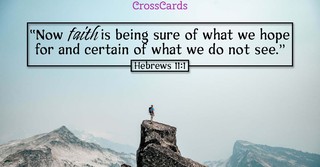
- Recent Translations
- All Translations
Yehudim in Moshiach 11:8
Share
Settings
Yehudim in Moshiach 11:8 Meaning and Commentary
By faith, Abraham, when he was called
The Alexandrian copy and the Vulgate Latin version read, "by faith he who was called Abraham"; but this call is not to be understood of his name; for though his first name Abram might be given him, in the faith of his being a great man, and his second name Abraham, when he himself was a believer; yet this change was made some years after the call referred to; which is that in ( Genesis 12:1 ) when he was called out of his own country, kindred, and father's house; which was an emblem of the call of God's people out from among the men of the world, and from their friends, relations, and acquaintance, and even out of themselves; and as Abraham was called from "Ur" of the Chaldees, so they from darkness, bondage, idolatry, and communion with wicked men; that, as he, they might not perish with idolaters, being chosen vessels, and for whom God has peculiar blessings in store: and so the grace of God is seen in calling them, without any respect to their deserts, as in calling Abraham: and the care and goodness of God may be observed, in raising up fit instruments to propagate his cause and interest. Now Abraham, being called
to go out into a place;
from Ur of the Chaldees, to the land of Canna;
which he should afterwards receive for an inheritance;
not in his own person, but in his seed and posterity, unless after the resurrection, in the New Jerusalem church state, and which inheritance was typical of heaven;
obeyed
the divine call; and which was a fruit and evidence of his faith, and may he called the obedience of faith:
and he went out, not knowing whither he went:
for though he went forth to go into the land of Canaan, and into the land of Canaan he came, ( Genesis 12:5 ) , yet, when God called him to go forth, and he prepared to obey his call, he knew not what land he was to go into; for it is only said, ( Genesis 12:1 ) ,
unto a land that I will show thee:
upon which words a Jewish commentator F18 has this note;
``he (God) did not immediately make known the land unto him, that so it might be lovely in his eyes;''and it is, elsewhere, said by the Jews F19, that Abraham
``came from Aspamia (i.e. Mesopotamia), and its companions, (Nkyh edwy hyh alw) , "and he knew not where" he was, as a man that is in the dark;''all which agrees with our apostle: and, from hence, it may be observed, that God sometimes leads his people in ways they have not known, though they are known to him, and are always right; and that it is the property of faith to follow God, when it cannot see its way; and a great mercy it is to have God for a guide. This also shows, that Abraham's faith agrees with the apostle's definition of it, ( Hebrews 11:1 ) .
F18 Jarchi in Gen. xii. 1.
F19 Bereshit Rabba, sect. 60. fol. 52. 3.

